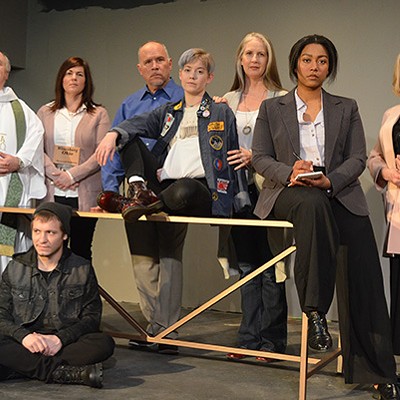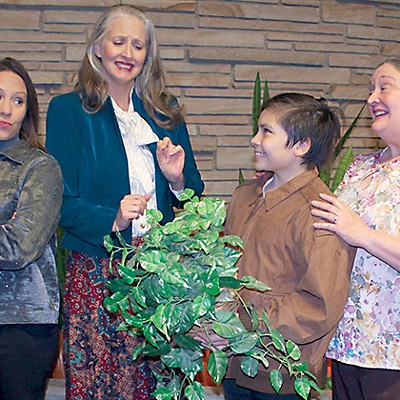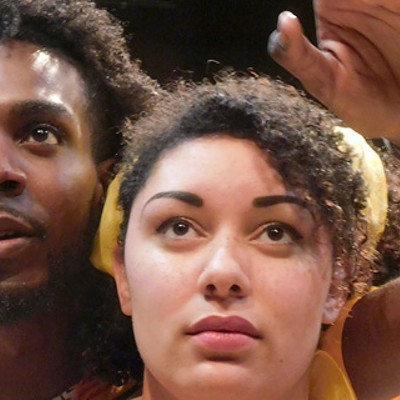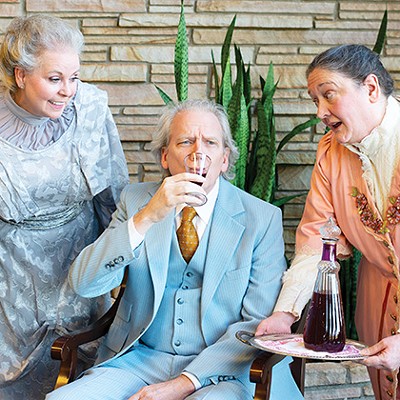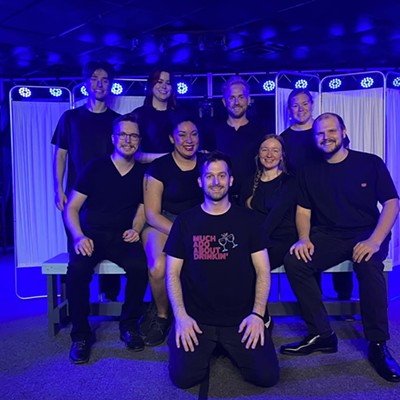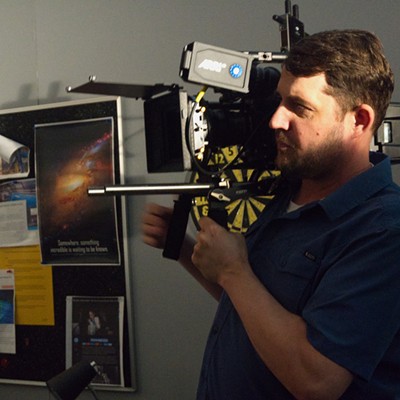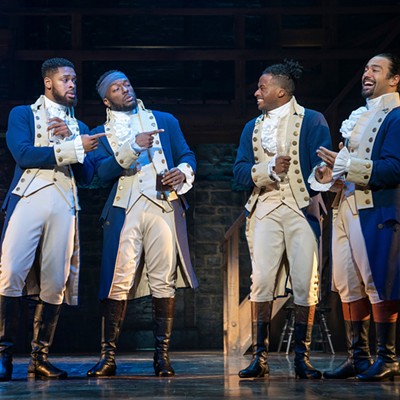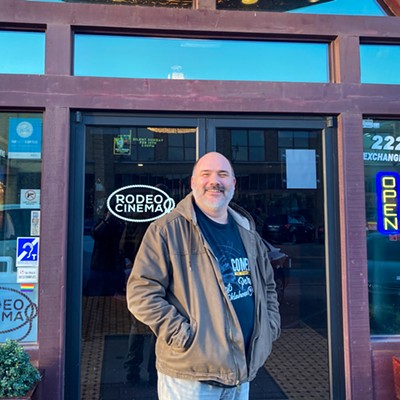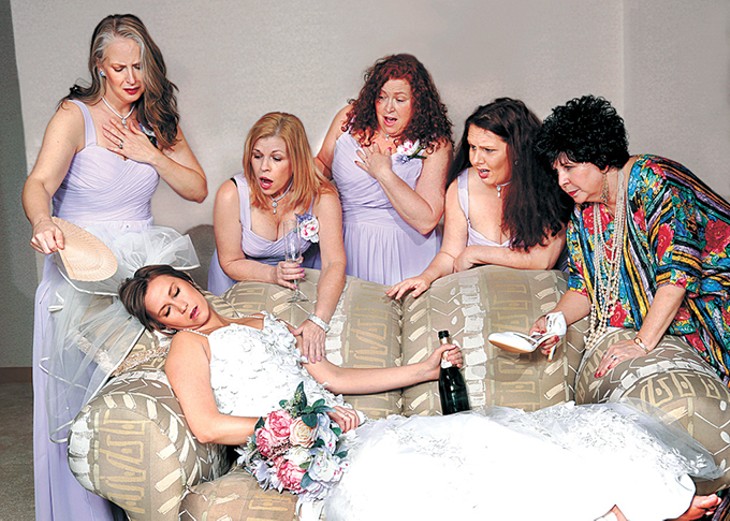
One way to define a comedy is that it usually ends in marriage, so what about a play that’s built around four friends and their four weddings? Jewel Box Theatre’s upcoming production of Always a Bridesmaid views commitment — whether spousal or platonic —through a humorous, heartfelt lens.
Always a Bridesmaid runs through May 6 at Jewel Box Theatre, 3700 N. Walker Ave., with performances at 8 p.m. Thursdays-Saturdays and 2:30 p.m. Sundays. Tickets are $20-$25. Call 405-521-1786.
Jessie Jones, Nicholas Hope and Jamie Wooten wrote Always a Bridesmaid, and they’re the team behind The Dixie Swim Club, a previous Jewel Box audience favorite, said director Doobie Potter.
“When the audience really likes something, it’s really fun to bring something from the same playwright back,” Potter said. “It’s the same kind of humor, but not quite as dark.”
Always a BridesmaidMcDonald-Walley, follows four friends Libby Ruth Ames (Denise Hughes), Monette Gentry (Teri Hood), Charlie Collins (Amy Kelly) and Deedra Wingate (Christine Jolly) from their senior prom, where they sneak Chianti and vow to always be each other’s bridesmaids, through their lives and weddings.
“The audience sees it every four years,” Potter said. “Every four years is a different wedding, all at this converted Victorian event center in Virginia.”
Sedalia Ellicott, played by Carol McDonald-Walley, owns the event center and gets to know the four brides very well throughout the course of the show.
This structure — jumping through time to show both change and constancy — also looks at the division between public and private. For much of the play, the four women are upstairs at the event center, getting reading for their weddings, Potter said. Such a time, generally thought of as private and intimate, before the public spectacle of getting married reveals how friendship can grow and deepen over the years — and, of course, makes for plenty of comedy. So do the bridesmaids’ dresses, ranging from stuck-in-the-’80s to over-the-top French fashion.
Temporal distinctions blur further at the final wedding, as Kari Ames-Bissette (played by Larrissa Garvin), Libby Ruth’s daughter, addresses the room. Kari functions as the show’s de-facto narrator, said Denise Hughes, her on-stage mother. Over the course of the show, Kari delivers multiple monologues.
“The whole audience is at her wedding reception, and she’s standing at the invisible table with her champagne glass, talking to her invisible groom,” Potter said. “She cannot hold her liquor at all.”
Always a Bridesmaid comes full-circle with Kari’s wedding, at which her mother and three godmothers are her bridesmaids, Potter said.

Creating familiarity
They say that comedy is harder than tragedy, and Always a Bridesmaid delivers plenty of supporting evidence. Staging a play about four women with a decades-long friendship, crystallized at crucial moments in their lives, comes with its own set of challenges, and creating a sense of familiarity and friendship remained crucial.
Potter, who directed the show in Ponca City in 2008, put her previous knowledge of the play to use by suggesting a longer than usual eight-week rehearsal period in order to get actors off-book as soon as possible.
“I wanted them to bond … as a cast because these four women have been together since elementary school, and by the end of the play, they’re well into their 50s. They’re the kind of people that know each other really well; they know all their idiosyncrasies and their bad habits and their good habits and their secrets,” Potter said.
Hughes said she has drawn from her own inner circle — her sister and two other women — in order to replicate the intensity of long-standing friendship onstage.
“I truly adore these women,” Hughes said. “The process has worked. … Every time we get on this stage, you can feel just a little bit more. I think by the time we open and we’re ready for an audience, they’re going to see four women who truly not just care about each other on this stage, but truly care about each other backstage.”
Depicting friendship on the stage also requires a specific sense of physicality and movement that draws on Potter’s background as a theater major at the University of Michigan and her time at Valley Studio, learning mime in Wisconsin.
“They’re doing a lot of physical stuff,” Potter said of the actors. “There’s always something — they’re eating … they’re chasing somebody around, up and down.”
This tendency toward movement and naturalism is even more essential at Jewel Box Theatre, where plays are performed “in the round” and the audience surrounds the stage. Unlike traditional proscenium stages, where movement can only go certain ways to ensure audience visibility, working in the round requires a different approach.
“As an actress … you can’t just go to the front of the stage and go sideways. … It’s more like real life,” Hughes said.
Actors move in circles, not standing in one place for too long or too near another actor, Potter said. When talking in real life, Potter said, you’re frequently also doing something else- — cooking or not looking directly at a conversation partner.
“That’s what you have to play when you’re doing this,” Potter said.
She furnishes the stage with real food and water and encourages actors to incorporate movements that feel natural.
Comedies can feel artificial, with deus ex machina endings and forced closure, but Always a Bridesmaid reveals the natural syncopations of long-lasting, non-romantic love.
“It’s just a sweet story about enduring friendship, love, affection,” Hughes said.
Visit jewelboxtheatre.org.

